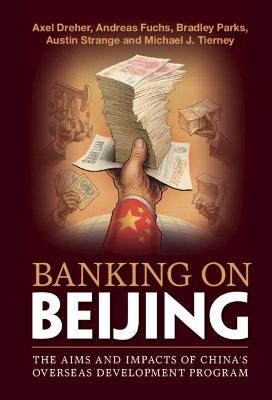
Banking on Beijing
Cambridge University Press (Verlag)
978-1-108-47410-8 (ISBN)
China is now the lender of first resort for much of the developing world, but Beijing has fueled speculation among policymakers, scholars, and journalists by shrouding its grant-giving and lending activities in secrecy. Introducing a systematic and transparent method of tracking Chinese development projects around the world, this book explains Beijing's motives and analyzes the intended and unintended effects of its overseas investments. Whereas China almost exclusively provided aid during the twentieth century, its twenty-first century transition from 'benefactor' to 'banker' has had far-reaching impacts in low-income and middle-income countries that are not widely understood. Its use of debt rather than aid to bankroll big-ticket infrastructure projects creates new opportunities for developing countries to achieve rapid socio-economic gains, but it has also introduced major risks, such as corruption, political capture, and conflict. This book will be of interest to policymakers, students and scholars of international political economy, Chinese politics and foreign policy, economic development, and international relations.
Axel Dreher is Professor of International and Development Politics, Universität Heidelberg, Heidelberg, Germany. He is also a Fellow at CEPR, CESifo, and AidData. Andreas Fuchs is Professor of Development Economics and Director of the Centre for Modern East Asian Studies at the Georg-August-Universität, Göttingen, Germany. He is also Director of the Kiel Institute China Initiative. Bradley Parks is the Executive Director of AidData, a research lab at William & Mary, Virginia. He is also a Non-Resident Fellow at the Center for Global Development. Austin Strange is an Assistant Professor of International Relations at The University of Hong Kong. Michael J. Tierney is Professor of Government and Director of the Global Research Institute at William & Mary, Virginia.
1. Why do we know so little about the aims and impacts of China's overseas development program?; 2. The journey to global creditor: a brief history of Chinese development finance; 3. Counting and comparing apples and dragon fruits; 4. Follow the money: where does Chinese government funding go?; 5. Apples and dragon fruits: how does China allocate aid and credit across countries?; 6. Aid à la carte: the subnational distribution of Chinese development finance; 7. Paving the way to growth and development? The socioeconomic impacts of Chinese development projects; 8. Poisonous dragon fruits? The side effects of Chinese development finance; 9. Banking on the belt and road: the future of global development finance.
| Erscheinungsdatum | 27.04.2022 |
|---|---|
| Zusatzinfo | Worked examples or Exercises |
| Verlagsort | Cambridge |
| Sprache | englisch |
| Maße | 158 x 235 mm |
| Gewicht | 710 g |
| Themenwelt | Sozialwissenschaften ► Politik / Verwaltung ► Europäische / Internationale Politik |
| Wirtschaft ► Volkswirtschaftslehre ► Makroökonomie | |
| ISBN-10 | 1-108-47410-1 / 1108474101 |
| ISBN-13 | 978-1-108-47410-8 / 9781108474108 |
| Zustand | Neuware |
| Informationen gemäß Produktsicherheitsverordnung (GPSR) | |
| Haben Sie eine Frage zum Produkt? |
aus dem Bereich


